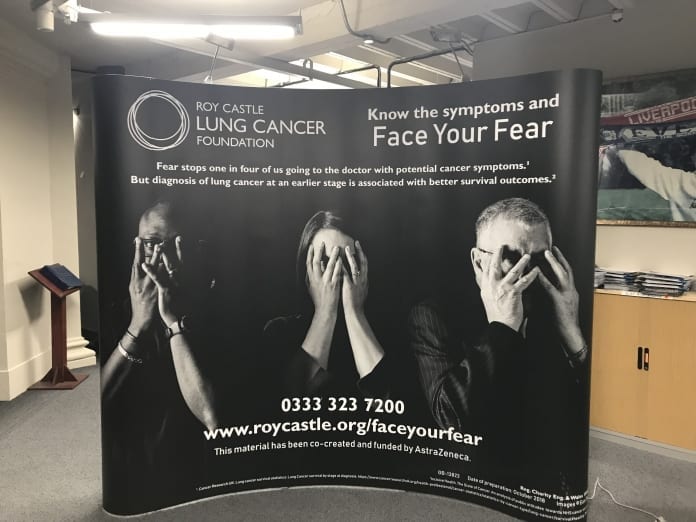- Fear stops one in four patients from reporting potential cancer symptoms, because of what the doctor might find.[i]
- Improving early diagnosis of lung cancer in line with the best performing Clinical Commissioning Groups(CCGs) could benefit at least 3,400 patients and could generate an additional 4,275 years of life.[ii]
- Lung cancer awareness month campaign,launched on Halloween, embraces virtual reality to encourage the public to ‘Face Your Fear’.
 [31st October 2018] – Fear is a major factor impacting earlier diagnosis of lung cancer, with a quarter of patients delaying reporting cancer symptoms to the doctor because of fear of what they might find, according to recent research.1With nearly a four-fold variation between CCGs in England highlighting the challenges of diagnosing early versus late-stage lung cancer1, Roy Castle Lung Cancer Foundation and Astra Zeneca are encouraging the public to Face Your Fear and act on potential lung cancer symptoms in a new campaign that launches today.
[31st October 2018] – Fear is a major factor impacting earlier diagnosis of lung cancer, with a quarter of patients delaying reporting cancer symptoms to the doctor because of fear of what they might find, according to recent research.1With nearly a four-fold variation between CCGs in England highlighting the challenges of diagnosing early versus late-stage lung cancer1, Roy Castle Lung Cancer Foundation and Astra Zeneca are encouraging the public to Face Your Fear and act on potential lung cancer symptoms in a new campaign that launches today.
Paula Chadwick, Roy Castle Lung Cancer Foundation, said: ‘This year in the UK, as many as 11,600 people diagnosed with lung cancer might have delayed reporting their symptoms to the doctor because they were scared, potentially missing out on an earlier diagnosis.Diagnosis of lung cancer at an earlier stage is associated with better survival outcomes – new treatments mean people are living well with lung cancer for longer and, if caught early, doctors treat with curative intent. It is crucial that people face their fear and report any concerns to the doctor;ignoring the symptoms of lung cancer will not stop you having it.”
The Face Your Fear campaign incorporates a virtual reality(VR) experience, which immerses viewers in content that confronts the fear stopping many people from reporting potential lung cancer symptoms.The campaign will also educate about the symptoms of lung cancer and highlight the positive impact that diagnosis at an earlier stage can have on patient outcomes.[iii]
In the UK,nearly 130 people are diagnosed with lung cancer every day,[iv] with half having stage IV disease[v], where cancer has spread to other parts of the body and is considered incurable.[vi]Patients diagnosed with stage I disease have the highest chance of survival, whilst only a small number of patients diagnosed at stage IV survive more than two years.3Recent research shows that cancer is the most feared illness among the public, followed by Alzheimer’s disease/dementia and motor neurone disease.1
Compared to Europe, the chance of survival for UK patients at five years after diagnosis are 4% lower.[vii]Within England, there is a four-fold variation between CCGs when comparing the number of patients diagnosed with early versus late-stage lung cancer.1 If early diagnosis rates were brought in line with the best performing CCGs, at least 3,400 patients could benefit and potentially generate an additional 4,275 years of life.2
Dr Cham Herath,Director of Healthcare and Medical Affairs, Astra Zeneca UK, said:“Facing up to the possibility of lung cancer is frightening, but diagnosing the disease at an early stage is vital for improving the odds of treatment and survival outcomes. As a company that is deeply committed to improving outcomes for people with lung cancer in the UK,Astra Zeneca is proud to be partnering with Roy Castle Lung Cancer Foundation on a campaign that tackles this challenge with education and sensitivity.”
The Face Your Fear campaign encourages people who have experienced any of the following symptoms [viii] to Face Your Fear and report them to the doctor:
Persistent cough – Change in a long-term cough – Ongoing chest infections–– Coughing up blood – Chest or shoulder pain – Loss of appetite – Unexplained weight loss, fatigue or breathlessness
The Face Your Fear exhibit will travel to cities around the UK including London, Bradford and Aberdeen. The campaign kicks off today with a national launch event for media in the Palace of Westminster.
The Face Your Fear campaign has been co-created and funded by Astra Zeneca.
[i] Incisive Health. The State of Cancer, August 2018. Available at:https://www.incisivehealth.com/our-publications/. Last accessed: October 2018.
[ii]Incisive Health. Saving Lives, averting costs, September 2014. Available at: https://www.cancerresearchuk.org/sites/default/files/saving_lives_averting_costs.pdf. Last accessed: October 2018.
[iii]Cancer Research UK. Lung cancer survival statistics: Lung Cancer survival by stage at diagnosis. Available at:https://www.cancerresearchuk.org/health-professional/cancer-statistics/statistics-by-cancer-type/lung-cancer/survival#heading-Three.Last accessed: October 2018.
[iv]Cancer Research UK. Lung Cancer Statistics: Lung cancer Incidence. Available at: http://www.cancerresearchuk.org/health-professional/cancer-statistics/statistics-by-cancer-type/lung-cancer#heading-Zero. Last accessed:October 2018.
[v]Cancer Research UK.Lung cancer incidence statistics: Lung cancer incidence by stage at diagnosis. Available at: https://www.cancerresearchuk.org/health-professional/cancer-statistics/statistics-by-cancer-type/lung-cancer/incidence#heading-Three. Last accessed: October 2018.
[vi]Post mus PE, Kerr KM, Oudkerk M, et al. Early and locally advanced non-small-cell lung cancer (NSCLC): ESMO Clinical Practice Guidelines for diagnosis, treatment and follow-up. Annals of Oncology. 2017;28(Supplement 4):iv1-iv21.
[vii]The Association of the British Pharmaceutical Industry. UK lung cancer care outcomes: A comparison with Europe. Available at: http://cancercomparator.abpi.org.uk/resources/ABPI%20lung%20cancer%20briefing%20July%202017.pdf. Last accessed: October 2018.
[viii] Cancer Research UK. Lung Cancer: Symptoms. Available at:https://www.cancerresearchuk.org/about-cancer/lung-cancer/symptoms. Last accessed: October 2018.
Help keep news FREE for our readers
Supporting your local community newspaper/online news outlet is crucial now more than ever. If you believe in independent journalism, then consider making a valuable contribution by making a one-time or monthly donation. We operate in rural areas where providing unbiased news can be challenging. Read More About Supporting The West Wales Chronicle




















